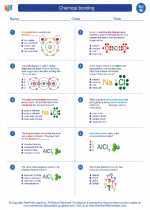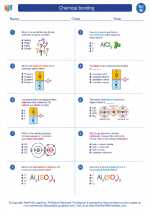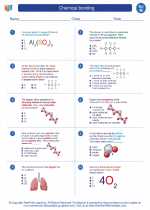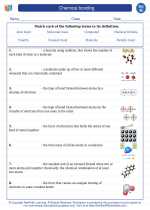Decomposition Reaction
A decomposition reaction is a type of chemical reaction in which a single compound breaks down into two or more simpler substances. This type of reaction is the opposite of a synthesis reaction, where multiple substances combine to form a single compound.
General Form of a Decomposition Reaction
The general form of a decomposition reaction can be represented as:
AB → A + B
Where AB is the compound that breaks down into simpler substances A and B.
Examples of Decomposition Reactions
Some common examples of decomposition reactions include:
- When calcium carbonate (CaCO3) decomposes into calcium oxide (CaO) and carbon dioxide (CO2):
- When hydrogen peroxide (H2O2) decomposes into water (H2O) and oxygen gas (O2):
- When ammonium nitrate (NH4NO3) decomposes into nitrous oxide (N2O) and water (H2O):
CaCO3 → CaO + CO2
2H2O2 → 2H2O + O2
NH4NO3 → N2O + 2H2O
Factors Affecting Decomposition Reactions
Several factors can affect the rate of a decomposition reaction, including:
- Temperature: Higher temperatures generally increase the rate of decomposition reactions.
- Concentration of reactants: Higher concentrations of the reactants may lead to faster decomposition.
- Catalysts: Certain substances can act as catalysts to speed up decomposition reactions.
Study Guide
When studying decomposition reactions, it is important to understand the general form of the reaction, as well as the factors that can affect its rate. Additionally, practicing the identification of decomposition reactions from chemical equations and understanding common examples of such reactions is essential. Make sure to review the examples provided and try to identify other decomposition reactions in your study materials or additional resources.
Furthermore, it is helpful to understand the concept of catalysts and how they can impact the rate of decomposition reactions. Be sure to review the factors affecting decomposition reactions and how they influence the overall process.
Finally, practice writing and balancing decomposition reactions to solidify your understanding of this topic.
[Decomposition Reaction] Related Worksheets and Study Guides:
.◂Science Worksheets and Study Guides Eighth Grade. Chemical bonding

 Worksheet/Answer key
Worksheet/Answer key
 Worksheet/Answer key
Worksheet/Answer key
 Worksheet/Answer key
Worksheet/Answer key
 Vocabulary/Answer key
Vocabulary/Answer key
